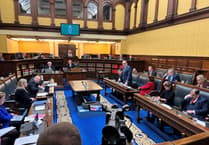This column first appeared in the Isle of Man Examiner of August 23.
Can I start by giving my appreciation to the Isle of Man Examiner?
As an opinionated person in a role which requires people to be opinionated, it’s so refreshing to get a forum in which I can wax lyrical without someone arguing with me (you’ll appreciate that I avoid the comment section under Isle of Man Today pieces).
So here I am again to discuss another topic, one that requires serious attention because people are being harmed daily; one that for a lot of people will require significant de-programming – and that is a big part of the problem. Honest, well-intentioned debate about drug issues is rare and for such a serious and impactful area, that really needs to change.
What has got me cogitating on this is that DHA Minister Jane Poole-Wilson announced in July’s Tynwald that a review of the harms caused by illegal drugs on the island will be undertaken by the Public Health Institute at John Moores University. It’s a (tardy, but) welcome announcement for many as the world moves towards understanding that prohibition has failed.
So why am I banging on about this if a review has been announced, you may ask.
Well folks, whilst I fully understand and endorse the desire for local evidence upon which to base policy, I also believe that there are actions we can and should take to reduce harm immediately, utilising extensive global evidence and research.
The human and financial cost of failed prohibition legislation is incalculable everywhere, including our fair shores. It is a major issue and should not be relegated. Action is needed now.
For more than 100 years, governments across the world have waged their various ‘wars on drugs’ – effectively, treating drug use as criminal and prohibiting certain drugs by utilising punishment.
Where has it got us?
Ignoring the often questionable reasons for prohibition, and focusing upon the impact on people – firstly, drug use has not reduced. In fact, many countries have recorded a significant uptick in drug use.
Secondly, the harm to individuals who choose to take drugs has increased.
This is because, of course, if you criminalise a widespread form of activity you will ensure many people don’t gain access to support services, and don’t get information that prevents serious misuse – and even, in many tragic recent cases, don’t ask for help at festivals or in nightclubs when experiencing misuse seizures, because of the implications associated with illicit drug use.
Thirdly, it is damaging our society as a whole. I recently attended an information day hosted by the Isle of Man Constabulary at the Villa on the issue of drug supplying over ‘county lines’.
We heard about the calculated targeting of vulnerable young people and adults and about the serious violence that organised criminal groups can inflict upon people who renege.
Our media have recently covered the horrific case of a young man who was raped by his dealer over a drug debt; our own Chief Constable commented publicly that this was ‘typical of the situations that arise in relation to drug debts’.
I personally have witnessed young lives forever marred by an early drug encounter that gives them a criminal record for their formative working years.
Fourthly, the waste of money and resources, and here I am thinking of government money, police time and court time. And finally, linked but separate, the undermining of credibility that this continued prohibition has had upon these institutions of authority.
So: our drug laws haven’t stopped people taking drugs, they are harming people and societal outcomes and they are costing us dearly. Drug issues impact all of us far more than is widely acknowledged and understood.
So far so predictable I guess on this issue – it’s nothing people who read newspapers or watch TV won’t have already heard.
Sometimes it feels like we have to implement Orwell’s double-think in this issue: we know our policy isn’t working but we can’t change our policy. With the review, we have even more reason to lean away from action.
OK, so let’s await the outcome of the review because any logical, rational appraisal of the facts cannot ignore the issues outlined above.
But let’s also take steps now to move away from zero tolerance, and move towards harm reduction.
Let’s open constructive and educational dialogue around drug use, including truthful and unbiased information given to teens in schools.
Let’s take practical steps such as police and paramedics carrying Naxalone (reverses the fatal effects of an overdose of heroin).
Let’s purchase some testing equipment and set up easy, no-prosecution testing centres so people can check the strength and content of what they are going to take (these are available at some UK festivals so our options aren’t limited here).
Let’s put an end to gaol sentences for recreational use, or even explore a no-arrest policy for recreational cannabis.
I want to make it very clear that I understand that drugs themselves cause harm. But what it’s really important to say is that focusing upon harm reduction does not increase use. Countries that have legalised or decriminalised report the same use as countries who have not.
But they also report fewer drug-related deaths: that’s a worthy goal in my eyes.
If we have a government proud of its longevity and independence it needs to be proactive. I believe our Island can still, and should, be brave and have the courage to act upon the wealth of evidence sooner rather than later.





Comments
This article has no comments yet. Be the first to leave a comment.